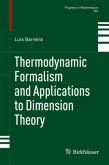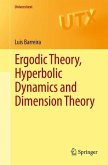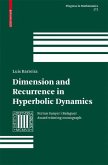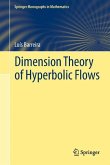This self-contained monograph presents a unified exposition of the thermodynamic formalism and some of its main extensions, with emphasis on the relation to dimension theory and multifractal analysis of dynamical systems. In particular, the book considers three different flavors of the thermodynamic formalism, namely nonadditive, subadditive, and almost additive, and provides a detailed discussion of some of the most significant results in the area, some of them quite recent. It also includes a discussion of the most substantial applications of these flavors of the thermodynamic formalism to dimension theory and multifractal analysis of dynamical systems.
From the reviews:
"This book gives a detailed account of the connection between two areas of dynamical systems, the thermodynamic formalism and dimension theory in dynamical systems. ... The book is probably best read by someone already familiar with the basics of ergodic theory, dynamical systems, and the Hausdorff dimension ... . the book gives the reader a good grounding in both thermodynamical formalism and applying the thermodynamic formalism to prove results in the dimension theory of dynamical systems." (Thomas Michael Jordan, Mathematical Reviews, March, 2014)
"This book gives a detailed account of the connection between two areas of dynamical systems, the thermodynamic formalism and dimension theory in dynamical systems. ... The book is probably best read by someone already familiar with the basics of ergodic theory, dynamical systems, and the Hausdorff dimension ... . the book gives the reader a good grounding in both thermodynamical formalism and applying the thermodynamic formalism to prove results in the dimension theory of dynamical systems." (Thomas Michael Jordan, Mathematical Reviews, March, 2014)









